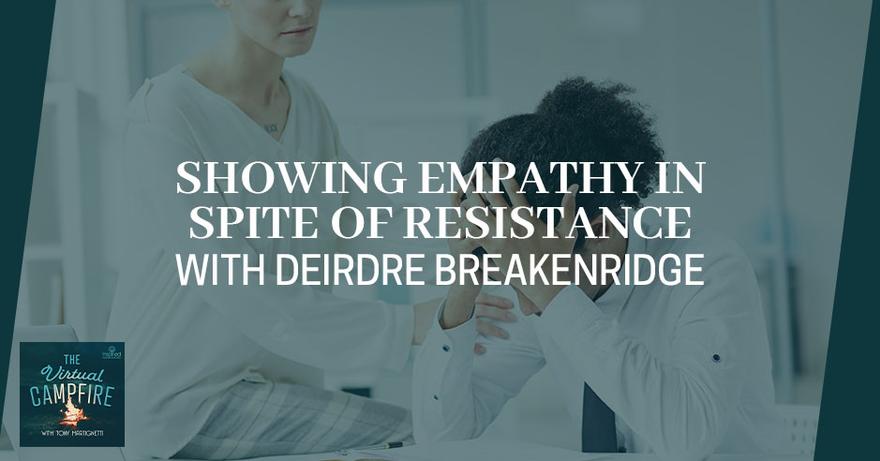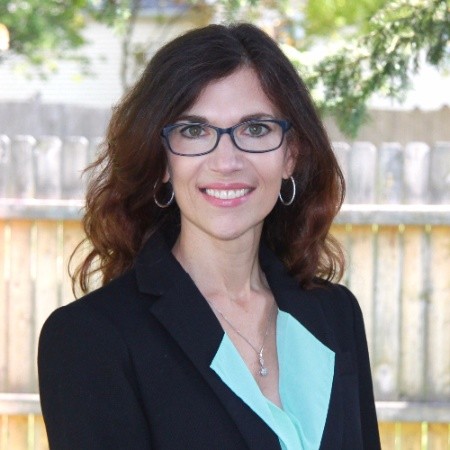Showing Empathy In Spite Of Resistance With Deirdre Breakenridge

Communication is always key, no matter what industry you’re in. But communication is not just about having the right bullet points; it’s about having empathy. Having that Feel aspect is vital to get your message across deeper. That is what today’s guest, Deirdre Breakenridge, expounds on together with host Tony Martignetti. Deirdre is CEO of Pure Performance Communications, a media trainer, LinkedIn instructor, author, and FEEL Coach. She discusses the FEEL Model and the importance of injecting emotion into how we communicate and even more so when facing resistance. Learn more about the Feel First Approach and the flashpoints in Dierdre’s life that led to its conception.
---
Listen to the podcast here:
Showing Empathy In Spite Of Resistance With Deirdre Breakenridge
Deirdre Breakenridge is an author and CEO at a company that helps businesses communicate and engage with their stakeholders better. She has over 25 years of experience in Public Relations and has a robust clientele of senior executives from mid-size and large organizations.
It is my honor to introduce you to my guest, Deirdre Breakenridge. She is the CEO of Pure Performance Communications. She's a career-long storyteller and media expert. She has helped brands and professionals to ignite energy and engagement, lead pressing conversations and grow their influence in the market. Deirdre has worked with senior leaders and organizations including the Academy of Nutrition and Dietetics, JVC, Kraft, Nasdaq, NBA Events & Attractions, and the Public Relations Society of America.
She's the author of six business books sharing stories and advice to navigate changing consumer behaviors and an evolving media landscape. One of her books, Answers for Modern Communicators, and her seventh book, Answers for Ethical Marketers, were published by Routledge. Deidre has been blogging at PR Strategies for over ten years and she's also the host of the podcast, Women Worldwide, which celebrated its fifth anniversary in 2020. Welcome to the show, Deirdre.
Thank you, Tony. It's great to be with you.
Same here. What an accomplished person you are. I’m so thrilled to have you on and see how you have come to this place in your life.
Thank you. It has been quite a journey. As you read things, I step back and I say, “I have had fun.” It’s good.
I often say that's a true sign of being in the right place that you have had fun along the way. Although it's not always fun.
I'm realizing more fun now. As I look back, I can see those big pockets of fun but sometimes when you are in it, Tony, it’s not exactly fun. We all have our challenges.
What we are going to uncover here is the journey that got you to where you are now. On the show, we call it flashpoints, the points in your life that ignited your gifts to the world and sometimes there's more than one. We are going to give you the space to share what you are called to share along that path and we will do some pauses along the way to reflect and see what's showing up. The floor is yours.
Thank you. I have always had these big moments and a lot of mini a-ha moments in between. There’s one huge flashpoint but there are two that I want to point out that set me on the path that I remember. It was the moment I realized that I was running somebody else's communications business and I said, “I can do this for myself. I'm going to be an entrepreneur.” Everybody around me thought I was nuts, especially my family because they didn't know where that entrepreneurial side and spirit came from. That was one.
I do remember the second time was when I owned a communications agency for fourteen years. I went off and I built my own company. It got acquired very quickly. The next time was when I said, “We are almost 50 people. I don't know if I want to do this anymore. I'm going to be a communications consultant and an author. I will continue with my writing and my speaking.”
We all need to feel in our interactions and communications.
Those were such big moments and changes but at the same time, they fed and fueled my passion. The minute I became a consultant, I had the freedom to write more, educate, create courses and do all the things that I love to do. I worked with executives on media, their presence and leading the conversations. Those are a couple of points that I did want to point out before the big point.
It's amazing because when you come into that place where you step back and say, “I want to do something different now,” it's hard to make that shift. It's a pivot point that most people struggle with because sometimes when you are doing well at something, you are like, “Why should I change something if it's working?”
That's exactly what happened in those two instances where people looked at me and said, “Why would you shake up something that's going well?” There are a lot that goes on in the exterior world. I'm somebody, whether I knew it then or not, I know it now based on what I read and believe but the external doesn't matter. It doesn't matter what you see and what's going on. It's what's going on inside. Inside, I was trusting this little voice that was saying, “Pivot, move, quick, go.” Maybe that voice was saying, “If you don't, you are going to stop enjoying.”
Getting out ahead of that is so powerful before you start hating what you do.
You don't ever want that to happen. I'm all for making that choice and do it yourself. There are big flashpoints when you don't have a choice and things play out around you that is all-consuming. You are almost forced to step back to take stock and say, “What am I going to do now? What am I going to do with this situation?”
I know you have a big one coming up. Do you want to jump right into that or do you feel like you want to play with space a little bit more?
I can jump right in. Being at a point in my career where so many wonderful things were going on from speaking to book writing. I'm a LinkedIn learning instructor and I taught university level for fifteen years. I work with the most amazing companies and executives all about their brands and thought leaders in the industry getting out there through media, the best way to do that and the training sessions. I was strategic in my thinking. You would have to be. You call yourself a communication strategist and it was a lot about the messaging and how the executives show up, the channels and those connections.
Until something happened that made me step back and put me on what I call the Path To FEEL. That moment was when my stepdaughter decided to end her journey with us. It was something that I would never want any family to go through. It makes everyone take stock of who they are, whether it's work or personally. It was at such a moment that I said to myself, “I need to understand communication even better.” All I wanted to do was talk to Millennials. I wanted to hear from other Millennials about how they were showing up in their relationships, their communication and what was important to them. What did they value?
These are all questions I probably wanted to ask my stepdaughter but couldn't so I was going to get answers from as many Millennials as I could. Some of the questions turned into, “What do you expect from the people around you? What do you need? What builds trust and a real relationship?” This is important personally and professionally. I did this whole study for 52 weeks and I learned a ton. The Millennials that I spoke with were on the phone with me for not just 10 and 20 minutes but 30, 60, 90 minutes and sometimes more, sharing how much they feel.
I formed a model and it was based on everything they shared qualitative data. It's called the FEEL First approach and FEEL is an acronym, which means you face your Fears, engage with Empathy, live with Ethics and good judgment, and unleash your Love. This is what Millennials wanted. Knowing this, it’s not just about Millennials. It's about everybody. We all need to feel in our interactions and communications.

It's mind-blowing and I feel it. I love that model. I have so many questions. First of all, I know you do a lot of work with women. This cohort that you built, was around both men and women?
Yes, because men and women are always in it together. Everything I do is men and women because we have to support one another. With the FEEL model and what I do through Women Worldwide, it's emotional intelligence at its best. You have to take stock in your own emotion, what's going on and your own self-awareness before you can even recognize what's going on in somebody else's world. I don't want to make too much of a generalization. I will speak about myself. We are a little too busy, a little not aware enough and certainly empathetic but there are levels of empathy. You have to dive in because in this world nowadays, look at what's going on.
All of the polarization, frustration and anger, it's time that’s recognized within facing your own fears and where you are with empathy, ethics and values. That builds trust in the relationship and how much you show your passion and love so that you can help someone else and connect on more than just a transactional level. Not to say that the communications work I was doing before was just strictly transactional but a lot of the strategy in communications is to get to a connection, when you get there, that's when you apply a FEEL lens so that you can build deeper and go deeper. Also, have that genuine, loyal and binding relationship that we all seek.
You have touched on something so near and dear to my heart and to so many people, which is we all need a deeper connection and it starts with yourself. There was something you said that made me think of something that we need to talk more about, which is this element of emotional connection. The fact that you can't relate with other people until you relate with yourself. That was the thing that I was thinking about. Knowing yourself and being able to take care of yourself on the inside before you relate to others.
Interestingly, Millennials are passionate about their causes and they want empathy. A lot of the situations that they shared, the examples of what they have experienced, even the F in face your Fears. they were saying, “What are you all afraid of? Why wouldn't you want to be more open? Why wouldn't you want to be more inclusive? Why wouldn't you want to step out of your comfort zones to understand?” It's so fascinating that leaders are born every day.
Based on my research and hopefully, there is a shift, we are seeing more leaders tap into the EQ side. You have to have that balance. It can't just be about innovation, vision, critical thinking, negotiating and confidence. You need all of the vulnerability, understanding, caring, kindness and interpersonal ability to build these relationships that are so important.
When you have an emotion or this feeling, it's about digging to the next level, peeling back and saying, “What else am I feeling?” There's an element of going deeper by constantly asking, “What else is there?” It is a fundamental coaching question but it is something that people don't often do. They don't keep on peeling back at the different levels.
It's hard. Maybe it's painful or you don't want to uncover something but there is something to be sad about sitting with a feeling and understanding that it's a contrast. Sometimes we sit with an uncomfortable feeling and we can say, “I feel this way. This is how I don't want to feel. What I do want to feel is,” Shift then to a better feeling. You have to recognize what it is that was there that is underlying as you peel back that onion to be able to get to a better place, be able to help others, and truly listen, understand and take it all in. Not have all these knee-jerk reactions that never lead to relationships.
I can't help but make the connection between where your story started, a person who excelled in helping people tell their stories and being the PR guru. You wrote books and understood communication well but at a surface level, it was more of, “What do we want people to hear?” Now it's like, “What do we want people to hear?” You are helping leaders to go the next level down. “What do you want people to feel?” Now your story is going that level down.
If you keep going with it and believe in it, you can make a difference.
I am feeling quite a bit more. I meditate every day. I can sit with myself and have a quiet mind. I'm journaling. I love reading. If I can get a book in a week, I am happy. Part of this is a test of yourself. Speaking of tests, I did want to share that it's easy to say, “I feel this way. I am empathetic. I do face my fears.” Sometimes, we are not the best judges.
Sometimes we are and sometimes we are not. My team and I developed a test. It's a FEEL First Test to say, “How much do you feel first before you go out there on social media, your media interviews, your one-on-one meetings or your group meetings in your workplace?” The test is based on your understanding of yourself. Do you face your fears and how open and inclusive are you? Are you empathetic and on what level does that mean?
Do you have ethics and values and how much do you practice them? Do you unleash the love and your passion? It is a 32-question test. It's more like one of those personality tests that you would take and you are scored in each bucket of FEEL. Depending on how you score, you get some exercises to help you because we want people to challenge themselves and take the test. We would love it if you took it into your workplace and other people took the test.
I can see it as almost a mantra that you start to incorporate into your day. Before you jump into a meeting or something serious, you say, “Feel first.” You start to get that into your mind like, “Before I jump in and start to activate myself into a meeting, how do I get into that emotional state of who I am and what I feel?” I often think about creating space. When people create space to become centered and think as opposed to being the author versus reporter of your day, you go on autopilot. Instead of being on autopilot, you can take control.
It's so different. When you are not on autopilot and you have that space, I find that ideas and creativity come so quickly. I also find that you put people at ease. There used to be public discourse and now it's all retreat to corners. When you are out there talking, especially as a leader, you are interviewing on a show, you are in your company or wherever you are, you are going to hear things.
If you are wrapped up in your own mind with no space, you will have a knee-jerk reaction and share too quickly. Rather than taking the time to say, “Why? How did you get to that conclusion? I want to understand. Where does this come from? Tell me more.” That at least puts people a little bit more at ease so you can get to the next level of the conversation. That comes from a clear mind.
There's an element of this that also makes me think of the energy that's read. When you are coming in triggered or you come in from that place of not being in your best power, then people read that and they pick up on your energy. They are not feeling the vibe of like, “They are not ready to receive me in the way that I want to be received.”
We are letting off all these signals. A lot of the time, we don't know it. Clearing the mind and being more present, and if you want to call it mindful, helps you to reset all those lower vibrations. I'm all about the vibrations and everything from the anxiety that's lower, the anger or the fear to the higher, which is the hope, joy and happiness. You connect on what you put out. If you are out there with that anger and frustration, what kind of energy are you going to bring in? It's going to be about the same. It’s like the Law of Attraction.
Tell me more about the journey. What has been the trickiest part since you have ignited into this world of going into the FEEL? This is relatively new. What has been the biggest challenge since you have stepped into this new world?
The biggest challenge is that some of the professionals that I encounter know how much they need FEEL but still resist it. That's number one. If they don't admit to needing it or if they do admit to needing it, they will say things like, “We need this in my organization but can we change the name of it because I can't bring FEEL into my company?”

I'm like, “Clearly, I can't change the name of it because a whole bunch of Millennials built it for me and it's based on what professionals need.” There has been resistance. That is a challenge. When there's resistance, I also know that it makes me feel more purposeful, this has a deeper meaning and I'm touching people on a level that is making them uncomfortable. If you keep going with it and I believe in it, you can make a difference.
I love that you said that because, in some ways, it’s pissing people off a little bit more than doing something powerful. There's something about that power behind it. The reason why I asked the question of, how is this a challenge, it’s because the challenge you are facing is to get that out in the world. If you didn't have a challenge around this, maybe there's something more to it that you are putting out there but it seems like you are in the right place.
If it was going too smoothly, I would almost think, “What's wrong?” There have to be challenges along the way. I am sticking to this course and I'm building online courses. That's how much I believe in FEEL. One of the first courses that I launched was Media Training with a FEEL First Lens. All those thought leaders out there, don't think you can show up to your media interviews with your talking points and your executive presence. It's important and you need to do that but there's more and it comes in the form of FEEL. That will be interesting to see who enrolls.
I also want to come back to the fact that it came from Millennials. Oftentimes, what's missing the most is this element of starting early with connecting early and that's the underserved part of this. I know you are serving people who are in the media space and leaders, and that they tend to get the most attention because of the dollars and what have you. We need to make sure that we are getting to people early with the messages about emotional connection, which is important.
I have had lots of my professor friends say, “FEEL should be in college.” They will turn around and be like, “No. FEEL needs to be in high school before they get to college.” They are then like, “No. FEEL needs to be in elementary school.” I will take it back to, “FEEL needs to be in the home with little kids.” Parent’s and kid’s feelings are important. All of this is a build that you take throughout your life and it's important. It’s a good compass.
The one thing that I always get jazzed about when it comes to these types of concepts is to think about it as whenever you are teaching somebody about these tools and about the way this work is the hope that the impact you have on them is the ripple effect. One thing that always gets me excited is if I could teach one person to be a better leader, to the better person, to have an emotional connection, hopefully, that person will pass it on and be able to have an impact on somebody else. Whatever direction that takes in their family, their subordinates or their colleagues, that's the hope.
I used to say that about my books, “If one person reads one of my books and it makes a difference, and then they go and share that with all of their colleagues or they take it to their friends or whoever, that would be wonderful. I would be happy.” It’s the ripple effect.
That's why we are here. That's why we find people who are kindred spirits. We want to make sure that we help each other to spread that message as wide as we can. When you find something that makes sense, you want to make sure that everyone hears about it and they can latch on to it and learn about it.
I want more FEEL out there.
We do, too.
Whether you are a man or a woman, EQ counts.
All of our platforms would help right about now.
I want to shift gears a little bit. You have had an amazing journey to get here. I feel like there's still so much we haven't dug deep into. What I want to know is what are the lessons that you have learned that you want to make sure people have known through this conversation?
I have learned the slow-down lesson. A clear mind, slow down, be more present is important for family and in your work. Being a woman in business, you often feel like you have to be strong, confident and all the things that are on the EQ side. It's good to show vulnerability. It's the vulnerability, the caring and the kindness.
For me, even though I may have thought that I was or operated a certain way, I will say to my 21-year-old self, “You could have slowed down. You should have been a little more who you were on the inside and let that come out.” I do remember mentors saying, “You’ve got to be tough. If you go in the board room, look them in the eyes. Act like a man and not a woman.” I'm here to tell you that the FEEL side is super important, whether you are a man or a woman. Those are some of the things that I learned.
That's such a great way to look at it, especially that advice that sometimes is well-meaning but sometimes you’ve got to take your internal intuition and your internal guidance system and say, “Now I know better. Now I know what it is. It's who I am on the inside who has to shine through.”
Also, to listen. Many of us think that we are great listeners but there are levels of listening. I hope I am in this level of active listening where before, I was listening as my smartwatch was going off or I had all these things binging. I was thinking about my next interview somewhere. Listening means that you are listening in your body and your mind. You are saying back words somebody knows you understood them. You are taking notes. You are asking questions. I have learned to be a much better listener.
It’s the questions that we constantly gloss over, like, “Who am I? Am I listening?” We have to question ourselves constantly but not in a way that is meant to be beating ourselves up. It's more from a place of truly understanding how we are showing up in our lives but also for other people. That’s what's coming to mind when I hear you talk about this. It's a reflection of our conversation. One last question, it’s different than the others. What is one book that has had an impact on your life or your thinking?
There are a lot of books but one that sent me on a different way of thinking was by Dr. Joe Dispenza and it's Becoming Supernatural. You have to read You Are the Placebo beforehand. That book got me to realize that it is about your thinking, the thoughts and what you are saying in the movies that are playing out in front of us. It's a toss-up. There are a couple of others that are good. The Complete Reader by Neville Goddard, which is also a lot about the thoughts and the subconscious mind.
I'm also enjoying The Law of Success by Napoleon Hill. I like this book because it talks a lot about harmony and the mastermind and how when you can connect with people, your minds are so much greater together. I went past one book. There are probably about ten others within this thought process and energy mind work that I have read but those stand out.
Those are great recommendations I love that you shared. I will let it slide because those were some great recommendations. Thanks for sharing.
You are welcome. Thank you.

I have to thank you so much for sharing some of the little glimpses into your story but also the amazing insights. I can't wait to get more of the story of FEEL into the world. I want to be one of your champions of that.
Thank you. That is wonderful to hear. I appreciate it. FEEL is truly one of the most important things in my life. It’s family and FEEL.
The two Fs. I want to give people an opportunity to find out more about you or where they can find you. Where are you showing up these days?
They can go to DeirdreBreakenridge.com, that's my website. It talks about my journey, about FEEL, all the ways that I work with professionals and my do-it-yourself tools that they can access. I love when people follow me on Twitter and ask questions. That's always a lot of fun. I'm, @DBreakenridge. LinkedIn, because I'm a LinkedIn learning instructor, I'm there quite a bit talking to the professionals and the students who take my courses. I share a lot on LinkedIn as well. My podcast is Women Worldwide.
I can't thank you enough for coming along and sharing what you have shared. I also want to thank the readers for coming along with us. Thank you. Hopefully, you have taken a lot of notes and enjoyed this.
Thank you so much. I enjoyed our discussion.
Important Links:
- Pure Performance Communications
- Answers for Modern Communicators
- Answers for Ethical Marketers
- Path To FEEL
- Women Worldwide
- FEEL First Test
- Media Training with a FEEL First Lens
- Becoming Supernatural
- You Are the Placebo
- The Complete Reader
- The Law of Success
- DeirdreBreakenridge.com
- @DBreakenridge - Twitter
- LinkedIn – Deirdre Breakenridge
- Facebook – Tony Martignetti
- Twitter – Tony Martignetti
- LinkedIn – Tony Martignetti
- https://Podcasts.apple.com/us/podcast/the-virtual-campfires-podcast/id1518302179
About Deirdre Breakenridge
 I’ve been a career-long storyteller working with professionals to ignite their communication, lead pressing media conversations, and build relationships resulting in business impact. As a PR and marketing strategist and CEO of Pure Performance Communications, my focus is strategic planning and relationship building that results in business impact. I’ve launched marketing and PR programs (from Fortune 500 to startups) delivering creative, passionate and bold stories that help brands and their thought leaders to be seen and heard and to build genuine relationships with their stakeholder groups.
I’ve been a career-long storyteller working with professionals to ignite their communication, lead pressing media conversations, and build relationships resulting in business impact. As a PR and marketing strategist and CEO of Pure Performance Communications, my focus is strategic planning and relationship building that results in business impact. I’ve launched marketing and PR programs (from Fortune 500 to startups) delivering creative, passionate and bold stories that help brands and their thought leaders to be seen and heard and to build genuine relationships with their stakeholder groups.
Love the show? Subscribe, rate, review, and share! https://www.inspiredpurposecoach.com/virtualcampfire


0 comments
Leave a comment
Please log in or register to post a comment